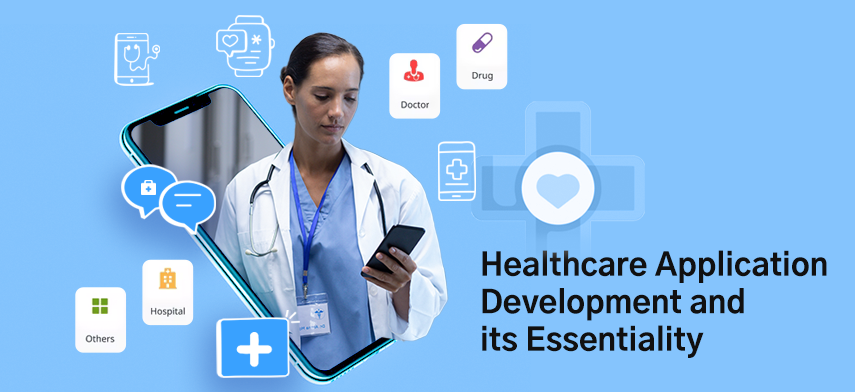The market for healthcare application development has already gained a lot of popularity over the years due to various reasons. Healthcare apps offer easier access to healthcare, betters the monitoring of health and tracking of diseases, provide technological development in the industry, and have higher user accessibility for medical needs via the internet.
Due to these reasons, the healthcare app development market is set to reach USD 100 billion by the year 2025. Mobile health apps or mHealth apps are growing at an increased intensity and various use cases have emerged throughout the years of global recognition for healthcare apps. Startups and established healthcare enterprises are investing time and effort into app development for healthcare practices.
Healthcare application development works in tandem with patients to aggregate data collection and helps providers with the healthcare apps software for providing necessary insights. Mobile health application development helps providers to track patient behavior between two consecutive appointments and adjust the pattern of treatment for better health outcomes. Furthermore, healthcare application development incorporates telehealth/telemedicine, wellness, remote patient monitoring, and other relevant apps for patient condition tracking.
Even then building mobile health apps can be tricky as it depends on an organization's tech stacks, features, budget availaibility, and business models. In this article, we will focus on the various aspects involved with healthcare application development.
Patient Expectations from Mobile Health Application Development
In 2022, the popular trend arose through medical solutions and mobile health apps. Healthcare providers and organizations are investing in digital health app development for improving their quality of care services and promoting self-management procedures for patients. Healthcare apps certainly provided convenience and assistance to patients who are more than inclined towards using these interfaces. In today’s time, a vast segment of people are using mHealth apps for appointment scheduling, communicating with doctors via telehealth platforms, and reviewing their prescriptions for medication management.
But there are certain drawbacks the majority of healthcare apps face even when their main goal is to improve overall patient health. Patients look for the three most basic functionalities when using healthcare apps. It includes:
- The ability to cancel and schedule appointments with their providers.
- The ability to request a renewal for the prescription to have access to their medication management.
- The easy accessibility to their health and medical records.
According to the suggested data, 11% of healthcare apps offer either one of the above-mentioned functionalities. The concern here is that hospitals are only able to engage 2% of the patients on their healthcare platforms. When it is about healthcare apps, it is mostly about efficiently offering user-friendly functionalities. In reality, only a hand full of healthcare apps have integrated two critical components to improving patient engagement on their platforms. From the data based on patient engagement, it is visible that healthcare organizations have been provided with an incredible opportunity to improve patient experience and enhance health satisfaction through mobile health apps.
Let’s understand patients’ expectations from mobile health application development.
1 Easy Accessibility to app functionality
It is a plus point to have unique functionalities in a healthcare application. But to keep in mind, the ease of accessible functionalities as a basic feature can improve end-user experience. Patients will ignore apps that utilize additional time to better their current health. Digital health app development for patients should help them save time for appointment bookings, scheduling, canceling, or changing with their providers. A successful mobile healthcare app development implements easy accessibility to necessary functionalities in the applications to save time and effort for patients and improve the patient experience.
2 Provide detailed and actionable information
Observing mobile health app statistics can show the receptiveness of patients on the platform. Patients are looking to download such apps as they provide a positive return for every investment made. Providing detailed and actionable information can help patients learn about their conditions and the causes, and understand what actions must be implemented based on the medical availability. Healthcare application development should focus on designing seamless integration of patient information regarding specific conditions. Using receptive and interactive tools and keeping the information in layman’s terms can keep patients engaged with the app.
3 Improved communication with providers
Mobile healthcare apps allow patients to freely and easily interact with their healthcare providers. According to data, it has been observed that roughly 75% of hospital visits can be avoided by tending to patient needs via video or audio call consultations. Having a platform that lets the user connect with their doctors can help both the care providers and patients. Telehealth and telemedicine services are being implemented to save time and effort on hospital visits. Thus, allowing providers to serve their patients on a more personalized level.
4 Building a patient community
Patients are eager to interact with others and connect with them. Building a patient community while creating mobile health apps can be important and easily accepted. Providing a social platform to patients can enhance healthy behaviors and faster rates of recovery. Surveys conducted globally, have found an increased patient engagement with a social in-app feature. This helps patients to interact with others going through similar conditions and lead to building healthier routines. This helps patients to be at ease and be a part of a supportive community. Having a social platform in an app can work as a great influencer in keeping patients engaged with the healthcare apps.
5 Simplifying digital experience
Consumers today look for elegant and simple user experiences when navigating through an app. The poor user experience of mHealth apps can lead to app disintegration due to a lack of patient engagement. Mobile health apps need to have user-friend UI/UX as it provides enhanced data visualization capabilities and they can be better retained by patients. Studies suggest that end-users prefer soothing navigation and colors when exploring an app. Keeping the target audience in mind, creating the UI accordingly can boost patient engagement at an increased intensity.
6 Implementing wearable devices
As we expand our digital health journey technologically, wearable devices and health trackers have become a popular way to keep in check one’s health and fitness regimes. Wearable devices have shown a faster adoption rate and it serves as a great opportunity in app development for healthcare organizations. Healthcare application development can integrate patient monitoring requirements in these wearable devices that can help to gather crucial data like blood sugar, heart rate, posture control, sleep patterns, physical activities, etc. this data can assist patients to learn more about their fitness regimes and provide a sense of control over their health and wellbeing.
Benefits of Healthcare Application Development
Being in the business of healthcare, organizations have wondered if creating and developing an app for healthcare is valuable. It is important to understand the benefits healthcare app development brings to the table when it comes to gaining patient engagement. Some of these benefits include:
- The ever-growing need for accessible healthcare services is increasing regularly.
- Patients and healthcare organizations have accounted for telehealth services being the most significant cost-effective form of delivering care as the demand for this technology grows.
- Healthcare practices are willingly investing in mobile healthcare application development to enhance the efficacy of healthcare services and support providers to make precise and personalized decisions for their patients.
- The communities are becoming self-aware, and they are increasingly more committed to preventive healthcare measures. This appeals to the niche of investors who are creating healthcare platforms to tackle the ever-growing need for patient satisfaction through digital health tools.
Creating and building an app that suits the needs and criteria of patients in receiving accessible care delivery services can immensely benefit one’s business by integrating healthcare application development into their frameworks.
Future of Mobile healthcare Application Development
Health tech and technology incorporation is evolving simultaneously. Several technologies are paving a path in the world of tech that is efficiently proliferating toward digital healthcare products and services.
Blockchain technology, artificial intelligence, machine learning, and other encrypted methods are securing healthcare information from external cyberattacks and protecting patient health data, improving diagnosis of patient conditions, and reducing human errors before the treatment process begins. The introduction of virtual reality in healthcare is enabling surgeons and healthcare specialists to perform examinations and surgeries from a long distance and allowing them to monitor health in real-time through these technological integrations. The future of technology is looking towards a brighter side that will create an impact on providers and how they help in treating their patients.

To conclude,
Knowing the process of developing healthcare apps, businesses have an in-depth idea of how health tech can be beneficial for their businesses. Healthcare application development adds a boost towards bettering care delivery services through the integration of technology and digital health tools. It is suggested to choose the right health tech company when developing healthcare apps and to know what are the trends in healthcare that you have to keep in mind when building an app from scratch. Choosing a Choosing an app development company that provides you with feature-rich quality app development for healthcare services and collaborating with a team with deep expertise in the field can improve the criteria for your app and help to create a cutting-edge application that caters to and suits your business perfectly. Healthcare software development companies like Mobisoft can enable your business to create that tailored healthcare product to enhance your business while keeping you at the lead in the healthcare market.





 May 6, 2022
May 6, 2022


